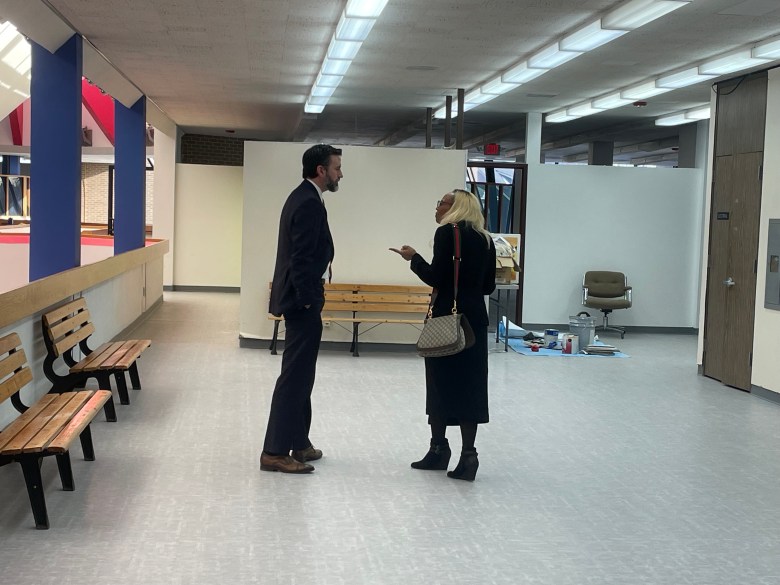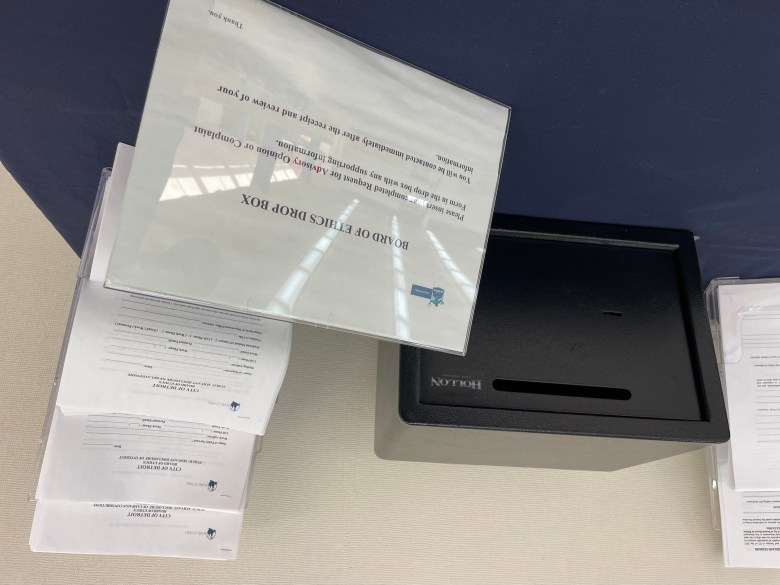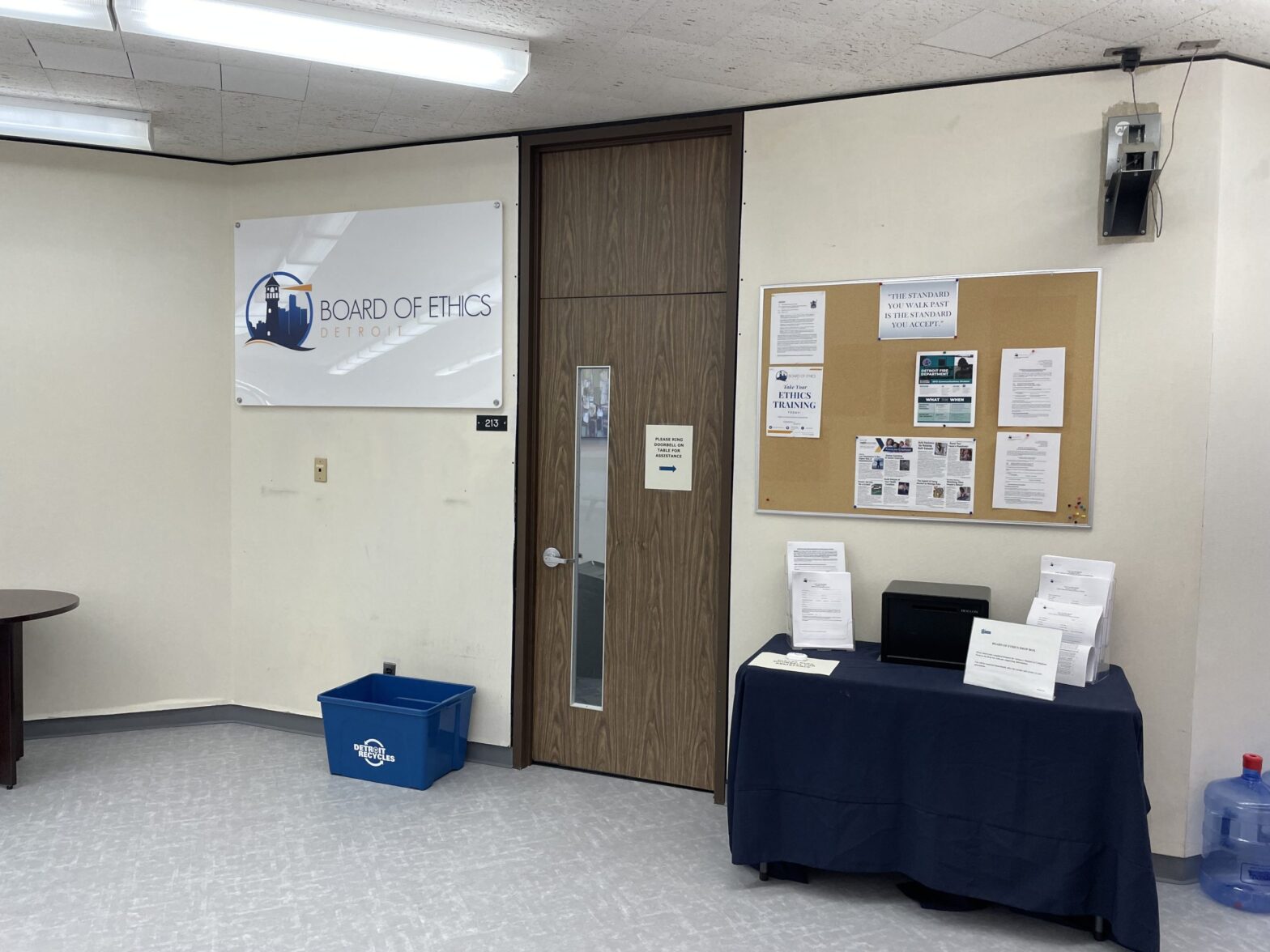The Detroit Board of Ethics has postponed a hearing to determine whether former city planning director Antoine Bryant violated ethics rules by unilaterally approving contracts for artistic murals.
Bryant left the city in December to join Gensler in running Detroit operations, the world's largest architecture firm with an office on the edge of Capitol Park. The ethics board opened an investigation last June and then scheduled a hearing for Jan. 15, but Wednesday's meeting quickly collapsed when General Counsel Delicia Coleman told the board it had no jurisdiction over former employees.
“We advise this honorable board that we will object to a hearing because Antoine Bryant is no longer an officer,” Coleman said. “If a hearing occurs, it will be deemed invalid and void.”
Related:
Coleman's assessment matched that of a city attorney representing Bryant, who argued the hearing should be canceled. The board decided to clarify whether former employees have been involved in ethics hearings in the past and whether Bryant is a contractor or supplier to the city before setting a new date for the hearing. If he is a contractor or vendor, Bryant is considered a public official and is subject to the board's jurisdiction.
Pat Cunningham, a senior management consultant assigned to represent Bryant, said the former planning director did nothing unethical. Cunningham said Bryant was wrong to approve a $215,000 contract with Street Art Mankind but did not personally benefit from the situation.
“He didn’t do anything unethical,” Cunningham said. “The Ethics Ordinance is designed to protect the people of the City of Detroit from self-interested government officials who make decisions that are in their own personal or financial interest rather than the best interest of the City. And that didn’t happen in Mr. Bryant’s case.”
“It was not good practice the way he handled the contract approval, and he admitted that, but that is not the reason we are here before the Ethics Committee.”

The Chairman of the Board Dr. Jameel Smith referred the questions to Ethics Board Executive Director Christal Phillips, who said the jurisdictional issue was one of several drawbacks the board faces in educating city employees about ethics rules and ensuring the rules are followed.
Phillips said her office is “understaffed and underfunded.” City Council members expressed interest in a “proportional funding ordinance” that would more fairly fund oversight agencies such as the Ethics Committee, Comptroller, Ombudsman and Inspector General.
The board is requesting $125,000 in additional funding for city employee training in next year's budget. There are just four employees responsible for keeping ethics rules current for more than 10,500 city workers. The board also needs independent legal counsel and additional ethics investigators, she said.
“We are at the whim of the government,” Phillips said.

Phillips said she could not share information about what the investigation into Bryant revealed, but believes the hearing should move forward. It was planned before Bryant left town in December, she said.
“We've seen cases where a former officer returns to the city, goes away for a few years, comes back, takes a job and it's like nothing happened,” Phillips said. “It is important to address potential ethics violations even if the person is no longer here. I think it sets a bad precedent if we say it's okay for an officer to violate the ethics ordinance and all they have to do to avoid consequences is leave town.
“I don't know what will happen with this particular investigation, but I believe that we should have the right to have a hearing… It is really disappointing to see our legal counsel, who is supposedly representing us, contradict that belief.” “
Coleman told reporters that she was fired by Phillips in December. Their last meeting was on Wednesday. Coleman said she will no longer advise the board on legal matters. Phillips said Coleman was actually fired from the position by management consultant Conrad Mallett after Phillips raised concerns about Coleman's professionalism and performance.
“I didn’t know it was her last day until she said that at the end of the meeting,” Phillips said. “I really think this is just another example of why it is so important that the board work toward having its own independent counsel, rather than one assigned to us by the legal department.”
Mallett will select a replacement, Coleman said, and she will remain employed by the city's legal department. She has advised the board since last August. Phillips said the board has appointed five attorneys as general counsel over the past three years.
“It was a surprise, but it wasn’t,” Coleman said. “I received information that shortly after I started there was a complaint from the managing director, before I really did much work. So I think it’s just a personality conflict.”
Cunningham said the board must hold a hearing within 182 days of beginning an investigation, a deadline that expired in December. Phillips said the hearing was scheduled within that time frame, but the legal team hampered the investigation.

“Our investigation was delayed for more than a month because the company's attorney refused to provide us with requested documents,” Phillips said. “That amazed me. My office reached out to the Information Technology Department and requested emails, and we were treated like an outside entity, as if we were journalists requesting this information and not a regulator.”
The New York nonprofit commissioned to create the murals spent several months talking with Bryant and Rochelle Riley, director of Detroit's Office of Arts, Culture and Entrepreneurship, about the installations on downtown buildings. The project was coordinated with other downtown improvement projects leading up to the NFL Draft.
Street Art Mankind hired artists from around the country, frustrating local Detroit muralists who felt the work should have gone to locals. The nonprofit also began painting murals on downtown buildings before a contract was approved. Bryant signed the contract and later sent a memo to City Council members apologizing for not following purchase protocols. The council voted unanimously to reject the contract in January 2024.
“They were not asked or instructed to begin work,” Cunningham said. “(Bryant) expected to recommend the contract to the City Council and he believed the contract was in the best interest of the city. The result would be murals that promoted social justice and that the city would maintain long after the design was completed. He simply made a mistake when faced with the dire situation of the contractor starting work without any say.”
Bryant has consistently refused to comment on the mural contracts and the ethics investigation. Phillips said she had no direct contact with him. Bryant instead communicated through his legal representative, she said.
“I have never heard of Mr. Bryant at all,” Phillips said. “He never responded to that office.”
